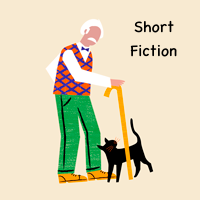My nephew flies a drone
over my grandparents' empty house,
over the orchard and empty barn,
...
[+]
Of course she does. It was only a year ago, and she’s been traveling ever since. She remembers traveling before, too, but always staying in Chicago, traveling between foster homes and juvies until all the names and places blurred into a photo reel of angst and separation.
One thing that comes before it all, though, one thing she can only just dredge up, is the face of her mother, weary, angry, sad, her home until the blur that held no home for her. She wants to go home. She wants to find her mother again, even if after twelve years there’s little chance she’s even alive, and go home to her.
Here isn’t home, she’s sure of it. It’s been a long time since she’s been in Chicago even.
The green hangs down around her, taking every opportunity to tangle her limbs in vines and throw flower-scent in her face in the humid air. Bits of pavement practically coat the ground below. The remains of a street, perhaps. But, just like a year before, it doesn’t stop the plants from taking a stranglehold on the soil and soaking in the sun above. Jannya sees bits of metal and glass embedded in them, some brick dust perhaps, but just like the pavement it doesn’t stop them.
Anyone and everyone she’d met had a theory on why the Growing happened, from the scientist muttering chemical jargon about some sort of massive fertilizer spill to the shaman type who’d blessed her when she’d come down with flu and told her that the Growing, apocalyptic as it was, was the Earth’s revenge on humanity for the pain it had inflicted. Jannya didn’t know, she didn’t have a theory, and she didn’t much care. She wasn’t smart enough to be a part of any effort to reverse it anyways. Years of bad grades and heartless teachers had drilled that into her head plenty, even without all the foster parents who’d smiled pityingly and said to the social worker that they just couldn’t keep someone like her around. She’d never had a home. Never been smart enough, good enough, charming enough to get one, not since her mother had left her on the side of the road.
Her mother had left her on the side of the road. There was a reason Jannya hadn’t put much effort into finding her—it had been self-evident that she didn’t have a home.
But maybe she could find one, if she could make her way back to Chicago. She thinks the major cities might have been spared.
The sun is going down and the air is cooling. It’s time to make camp for the night. She has experience with that, from all the times she’s broken out of juvie, terrified out of her wits that she’d be killed or taken or pressed into one prison gang or another, desperate to get out and find somewhere she could call home, maybe, or at least just get out of another non-home. There’s fabric and poles in her sack that she takes out and sets up in a spot relatively clear of plants and glass shards. Another piece of fabric she ties up to each pole to make a hammock of sorts, and she climbs inside, digging out a little of the fruit and meat she’s gathered and hunted over the past few days. Dinnertime, then sleep.
Tomorrow she’ll continue on.
When she wakes up again, the sunlight is watery through barely-visible clouds, but it’s enough to get her up and moving again. She wants to explore deeper into this jungle, maybe find some more food. It’s not like she can just go buy some at a convenience store anymore. She has to work for it. That was one good thing about all that time in juvie or foster homes—she’d gotten food and a bed and, at least in the foster homes, a relative sense of security. Here she was on her own entirely, and so it couldn’t be home.
Maybe in Chicago she could find a home.
The jungle was thick and the vines aggressive, but her stolen machete worked well on them and she forged deeper. The pavement and glass and metal only intensified as she continued. Sometimes she even came upon a partial wall, wrapped in weeds and green, still standing even after a year of attack. Yes, there was still hope; if these walls could still stand, how much better could the skyscrapers of Chicago hold against the Growing? She could find a home there, in metal and steel and pavement surrounded with green, in fellow survivors and half-familiar faces.
She was alone right now, though. She’d been alone for...most of her life, really.
She wanted to go home. Wherever home was.
Through the canopy she caught a glimpse of steel and glass—a painfully familiar glimpse. Was that the Chrysler building?
It was, and suddenly she realized: She was home.
And she would never be home again.



